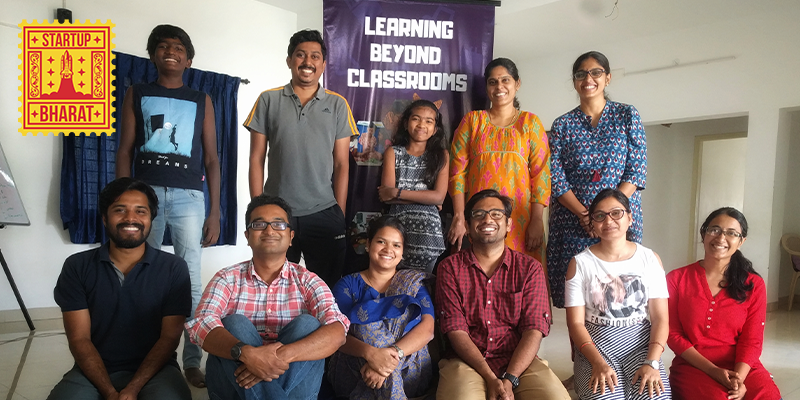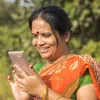It is said, if you want to learn something, try teaching it to a child. This idiom got Obuli Chandra to quit his job at Groz-Beckert and think of ways to teach physics to children.
At the same time, Arumugham Shankar, an investor at Unitus Ventures, was volunteering with NGOs to teach Computers to first-generation school-goers and was also working on a startup idea to make affordable computers using Raspberry Pi (a series of small single-board computers), so that children can become self-learners.
Obuli and Arumugham met at a Smart City Citizen volunteer gathering at Coimbatore in 2015 and spent time sharing their journey so far. They both decided to experiment with a three-day summer camp on Astronomy at an apartment in Coimbatore, where six children enrolled. That is when they realised that certain parents and children also believe in curiosity-driven education and are willing to pay.
It led them to start Mango Education. It is an alternative school for fundamental and applied sciences, focusing on children of age 5–15 years. The programme is designed in a way that the child has choices.

The Mango Education Team
How does the programme work?
First, the child attends various workshops. This is called the "Mango Discovery program". Then the child decides on a Mango learning path. For example, if the child chooses
Astronomy, then they set on a learning path as Young Astronomers. They take up a basic course for three months and then an intermediate course for nine months.
Once they are done with it, they can join the "Mango Astronomy club". As a part of that, children get involved in public education programmes. They conduct events during eclipses and build models to educate the public about these natural phenomena that are often misunderstood. They also travel to various research facilities across India and interact with scientists and experts in the field of astronomy.
“We predominantly work towards experience-based after-school programmes, education trips, and online self-paced courses with passionate educators, industry professionals and scientists. As of now, we have addressed more than 5,000 students through our workshops and we have over 50 children who had been travelling with us for more than three years,” Arumugham tells YourStory.
They are now building a team of like-minded educators. All the learning expeditions, courses in Wildlife and Astronomy, etc are more personalised and take place in small batches. This helps the team to work qualitatively with children.
Building Science Radio
The team realised that they could scale up in terms of value creation.
“During the lockdown, we started “WhatsApp Radio”, we call it “Mango Science Radio”. As part of this project, people who subscribe to us on WhatsApp would receive science stories from passionate educators and scientists from various fields of sciences every evening,” says Arumugham.
On the first day itself, they had close to 100 subscribers and now have over 2,500 subscribers that include science teachers, parents, and children from across the country. They also have a few NRI subscribers.
“We have listeners from Assam, Sikkim, and Pune to Tier-III cities in Tamil Nadu and Kerala. The best part is now Mango Science Radio is a community. We have listeners who turned into volunteers. The same stories are now being translated in Tamil, Marathi, and Malayalam. We have requests for stories in Telugu, Hindi, and Bengali. We also have a weekly community event called ‘Mango Open House’, where experts/scientists from various fields of education, science, and technology across the globe engage and interact with children and parents,” he adds.
The model
Currently bootstrapped, Mango Education works independently from schools. The team setup Mango Education with their personal savings. The team works with educators, children, and parents, directly. This gives the team more insight into how children learn. Arumugham adds that they involve parents in education and enable educators to understand how both parents and children think.
The costs of the programme depend on the learning path the child chooses. For example, in astronomy, they can start with a workshop for Rs 750, followed by a three-month course - Rs 6,000, then a nine-month course - Rs 25,000, and then annual membership for astronomy club – Rs 9,600. So goes for other streams in Wildlife, Technology and Automobile. Children can still opt for other programmes and workshops independently to explore their interests.
Market and the future
The HRD Ministry says that more than 1.5 million students graduate from engineering schools every year, but not many of them get employed. A 2018 report by India Skills says around 48 percent of engineers in the country are unemployed. Pearson Research adds that 95 percent of Indian engineers are not equipped for development and coding jobs.
The focus is, thus, on early skill and experience-based learning. There are startups like Bengaluru-based Taare Zameen Par, which works as a mobile planetarium to give children experiential learning. Tata Trusts-backed PiCards uses unique ways to understand how each student learns and understands.
Speaking of their plans for the future, Arumugham says,
“We are a company that is as passionate about education as we are about science. The dwindling number of scientists and movements like 'Make in India' has been primarily because of the lack of right exposure across the spectrum of education (in particular, science education) that is biased towards jobs and certificates, instead of curiosity and questioning. Mango Education wishes to build an ecosystem that promotes scientific temperament and problem-solving skills that could help create a generation of researchers and innovators.”
(Edited by Kanishk Singh)
Want to make your startup journey smooth? YS Education brings a comprehensive Funding and Startup Course. Learn from India's top investors and entrepreneurs. Click here to know more.
Link : https://yourstory.com/2020/05/startup-bharat-investor-edtech-science-coimbatore-mango-education
Author :- Sindhu Kashyaap ( )
May 29, 2020 at 05:15AM
YourStory


